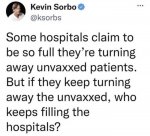
People Are Hiding That Their Unvaccinated Loved Ones Died of COVID
With the arrival of vaccines, compassion for COVID deaths began to dry up, sometimes replaced by scorn.
People Are Hiding That Their Unvaccinated Loved Ones Died of COVID
With the arrival of vaccines, compassion for COVID deaths began to dry up, sometimes replaced by scorn.
By Andrea Stanley
The Atlantic
JANUARY 18, 2022, 7:30 AM ET
After Andreea’s mom died of COVID-19 in April, the harassment started. Noxious messages started coming in after she wrote a Facebook post letting friends and family know about her loss.
One person messaged her to say they couldn’t believe her mother hadn’t protected herself. Andreea has since deleted most of the other messages, but she remembers people saying things like “I can’t believe your mom was an anti-vaxxer” and “I can’t believe she didn’t understand that COVID could kill you.” “Instead of people saying that they were sorry for my loss, they would question my mom’s medical choices. It became all about her vaccine status. It was incredibly hurtful,” Andreea, a language instructor, who asked to be identified by only her first name in order to prevent further harassment, told me.
It also wasn’t true that her mother was an anti-vaxxer. According to Andreea, her mom, who was a nurse, did have initial concerns about the vaccine, but after talking with her doctor, she had scheduled an appointment for her first dose. Unfortunately, she got sick before she could get it, Andreea says.
In 2020, dying of COVID-19 was widely seen as an unqualified tragedy. It was the beginning of the pandemic, when it felt as if the entire world was in a state of collective grief. There was a palpable, shared mourning for all the lives gone too soon: the smiling mothers and jokester grandfathers and so-and-so from church who always lent a helping hand. All victims of a virus, unfurling and cruel.
But that was before the vaccines. Before COVID deaths got caught up in a culture war.
Now the majority of COVID deaths are occurring among the unvaccinated, and many deaths are likely preventable. The compassion extended to the virus’s victims is no longer universal. Sometimes, in place of condolences, loved ones receive scorn.
Vitriol doesn’t come just from familiar names, but also from strangers. Websites, message boards, and social-media accounts have cropped up as forums to insult the unvaccinated dead. They scour social-media pages for “covidiots” and screenshot their photos and posts, turning them into memes. One Reddit page even gives out “awards” to those who refused the vaccine and then died.
“A few months after the vaccine became available, that was really the turning point for when we began to see an acceleration in the lack of empathy for those who passed away due to COVID,” says Kristin Urquiza, who co-founded Marked by COVID, a grassroots group that advocates for those affected by the pandemic, after her dad died of COVID in June 2020. She told me that even in forums dedicated specifically to grief, when someone posts about a COVID death, often the first thing people ask is whether the person was vaccinated.
That interrogation, and the judgment that may follow if the answer is no, has made opening up, especially online, hard for those who lost an unvaccinated loved one to COVID-19. “I have people reaching out to me confiding on a more one-on-one level that they’re struggling and they want to talk about their loss, but they don’t feel safe. They’re afraid they will be attacked or they’re afraid of their loved one being attacked,” said Urquiza, whose organization works with thousands of people across the country.
Instead, many obituaries and memorial posts on social media don’t tell the full story, referencing pneumonia or other complications that stemmed from COVID-19 without invoking the coronavirus itself. Sometimes, no cause of death is given.
When AnneMarie Jenkins, a marketing consultant from Bluffdale, Utah, lost her mother to COVID in August, she and her family didn’t mention the disease in their online announcement. According to Jenkins, her mother had a history of lung issues. She also told me her mother’s doctor had advised her mom against getting the vaccine. “We didn’t want anyone to have an opinion on … my mom’s medical choices. It makes the topic COVID and not my mom,” Jenkins said. “We didn’t want my mom’s death to feel like clickbait.” The obituary attributes her death to pneumonia and other factors.
This is just one of many examples shared with me—there was the dad who died of a “brief illness,” the mom who passed “peacefully,” the boyfriend who died too soon. Several people I spoke with said they don’t confess the true cause of death to others even in person, because they’re ashamed, or because they want to avoid follow-up questions, or because they don’t want their loved one’s death to be politicized and gossiped about.
But in private, it is hard for the living to make sense of these deaths. While everyone I spoke with for this story was vaccinated, many had relatives who were still opposed to getting the shots. This can create a fragmented mourning experience, divisions within a family, or even estrangement.
All of this takes a toll. In the 1980s, Kenneth Doka, a senior vice president of grief programs for the Hospice Foundation of America and the author of Grief Is a Journey and other books on dying, coined the phrase “disenfranchised grief.”
“We see disenfranchised grief when a living loved one doesn’t feel they can fully grieve because of the societal taboos around a loved one’s death,” Doka told me. “We see this when the victim is perceived to have had a role in their death, like we saw during the HIV/AIDS epidemic, but also with other things, like suicides, drug overdoses, and certain diseases.”
These sorts of deaths can be met with victim-blaming, a sense that the deceased to some degree brought their death upon themselves through their choices or risky behaviors. Lung cancer is a classic example—one study found that people were more likely to ascribe blame to lung-cancer patients who smoked than those who didn’t. “I think the same thing is happening with COVID,” Doka said. “But now, instead of asking if the person smoked, we’re asking if they were vaccinated.”
It is true that unvaccinated people are at greater risk of getting COVID, and of infecting others. It’s also true that unvaccinated patients dominate hospitals, which have been stretched thin for a long time by the pandemic. Some vaccinated people, stressed and angry about living through a pandemic for nearly two years with no clear end in sight, have understandably become more and more frustrated with those who refuse to get or deny the efficacy of the vaccines. But it’s not true that every unvaccinated person is an anti-vaxxer. And every preventable COVID death is still a deeply personal loss for someone. In some cases, the understandable frustration of vaccinated people is transmuting into cruelty, hurting those who are already suffering, and probably not changing anyone’s mind in the process.
“This particular form of schadenfreude is really not showcasing humanity at its finest,” Karla Vermeulen, the deputy director of the Institute for Disaster Mental Health at SUNY New Paltz, wrote in an email to me. “It’s a classic control mechanism, like our knee-jerk desire to know if someone who died of lung cancer smoked, or if someone with liver disease drank: If so, we can believe they were responsible for their own fate, and because we’re making a different choice, that fate won’t befall us. But of course that belief comes at the price of blaming and even vilifying the deceased … As a result, survivors might sacrifice honesty in order to protect the loved one’s image, at potential cost to their own emotional needs.”
When people feel they can’t be completely honest about a major loss in their lives, it makes the bereavement process more intense and long-lasting, potentially even leading to “complicated grief,” in which grief doesn’t get better over time, but lingers and sometimes gets worse.
Talking about the death offline, with select, trusted others, may be the best way to heal. “It is very hard to grieve someone fully while keeping a secret about them, as it’s important to acknowledge the entirety of the individual, positive and negative, in order to come to terms with their loss,” Vermeulen said.
She suggested talking with a therapist or religious leader, “someone trained to maintain confidentiality and a non-judgmental position.” Some organizations also offer support, such as Marked by COVID and COVID Survivors for Change, and Facebook groups have sprung up those who have lost loved ones to the virus.
Andreea, who has still not had an official service for her mother because she doesn’t feel she can emotionally handle any more questions about her mother’s vaccination status, found comfort in an online support group specifically for those who lost a loved one to COVID-19. “It is a community of people who understand what I’m going through,” she said.
Harder to process, perhaps, than other people’s judgments are one’s own. Many surviving loved ones experience anger, guilt, and shame too: Why didn’t they just get vaccinated? What more could I have done to convince them to get the shot? How could they have put so many people at risk?
“On top of the horrible death you experienced, there’s always the question of what if?” Andreea said. “What if I convinced my mom to get the vaccine sooner? There is an extra layer of guilt.”
Jason Coombs, a software engineer from Pittsburgh, Pennsylvania, whose mother died of COVID-19 in October, has found his grief to be laced with anger. “I spend time and energy angry about my mom’s … unwillingness to take simple precautions to protect others,” he said.
“The way a person died and the decisions they made may certainly complicate a person’s grief and ability to mourn,” Doka said. “I think how you grieve someone who died of COVID is you mourn the person and not the disease … Regardless of how somebody died, this person was important to you … You have to separate to some degree. The point is a person has died.”
If it’s hard to see the person as a victim of COVID, the experts I spoke with suggested trying to look at them as a victim of something else: misinformation.
When you shift your perspective, it helps create understanding and decreases the anger you’re feeling toward the person themselves, Vermeulen explained. “That certainly doesn’t mean you need to agree with [the person’s] view, but it might be a lot less painful to cope with the loss if you can reframe it.”
Think of it this way, Vermeulen suggested: Change “Grandpa was a stubborn man who we couldn’t convince to get vaccinated” to “Grandpa was unfairly influenced by the distorted media messages that misinformed him.” As Vermeulen explained, “The loss doesn’t change, but some of the baggage around it might, freeing the survivors to focus on the person rather than their choice.”
The pandemic is affecting all of us, shaping nearly every aspect of our lives. The discourse around COVID-19 can seem loud and crowded. Yet the reality is that so many people are grieving silently and alone.







